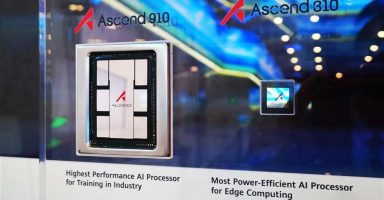Ascend 910 was announced along with company’s MindSpore AI Framework
Huawei has officially launched Ascend 910 — an artificial intelligence (AI) processor processor, with all-scenario AI computing framework called MindSpore. The Chinese tech giant has claimed it to be the world’s most powerful AI processor.
With the launch of this new AI processor, Huawei has joined the industry players Google, Intel, Qualcomm, and Nvidia. With the claim of “a most powerful AI processor”, the Ascend 910 is built for servers.
The Ascend 910 is supposed to be used for AI model training and according to company’s claims, it performs much better than previously expected. Belonging to Huawei’s Ascend-Max chipset series, the company announced Ascend 910’s planned specs at Huawei Connect 2018.
Ascend 910
The technical details brief that the Ascend 910 delivers 256 TeraFLOPS for half-precision floating point (FP16) operations. And for for integer-precision calculations (INT8), the processor delivers 512 TeraOPS. The interesting fact is that Ascend 910 should have been consuming 350W according to planned specs, but it only used 310W, company stated.
Ascend 310
Huawei says its Ascend 310 is already being used by leading automakers in shuttle buses, new-energy vehicles, and autonomous driving. Belonged to Ascend-Mini series, the Ascend 310 packs a 16-channel FHD video decoder and is capable of 16 TOPS in integer precision (INT8) and 8 teraflops in half-precision (FP16). Ascend 310-powered Atlas series acceleration card and server are now a part of “dozens of industry solutions developed by dozens of partners.”
MindSpore AI Framework
Along with the Ascend 910 AI processor and the Ascend 310, Huawei also launched an all-scenario AI computing framework, dubbed as “MindSpore”. It’s an extensible AI framework that can be compared with Google’s TensorFlow and Facebook’s PyTorch.
Huawei as told that MindSpore has 20% fewer lines of core code than other leading AI frameworks, including those mentioned above. That eventually raise developer’s efficiency by 50%.
According to the company, MindSpore is going right on track with its development goals – easy development, efficient execution, and adaptable to all scenarios.
Huawei has also mentioned about privacy concerns, as the MindSpore framework completely takes care of it. MindSpore ensures user privacy as it doesn’t process the data itself — instead it only deals with “gradient and model information” that has already been processed. Hence it protects sensitive user data effectively even in cross-scenario environments. It also ensures that its AI models and algorithms are secure and trustworthy.
The AI framework’s design allows developers to build advanced AI applications easily and “train their models more quickly.”
Through framework innovation, as well as co-optimization of MindSpore and Ascend processors, Huawei’s solution can help developers more effectively address complex AI computing challenges and the need for a diverse range of computing power for different applications. This results in stronger performance and more efficient execution. In addition to Ascend processors, MindSpore also supports GPUs, CPUs, and other types of processors.
Eric Xu, Huawei’s Rotating Chairman emphasized while introducing MindSpore AI framework, that Huawei has committed to build “a more robust and vibrant AI ecosystem.”
Press Statements
“MindSpore will go open source in the first quarter of 2020. We want to drive broader AI adoption and help developers do what they do best.” — said Eric Xu.
Xu said that “Without a doubt, it has more computing power than any other AI processor in the world.”
“Everything is moving forward according to plan, from R&D to product launch. We promised a full-stack, all-scenario AI portfolio. And today we delivered, with the release of Ascend 910 and MindSpore. This also marks a new stage in Huawei’s AI strategy.”
Xu told that the company has been slowly working on it since they announced its AI strategy in October last year.





